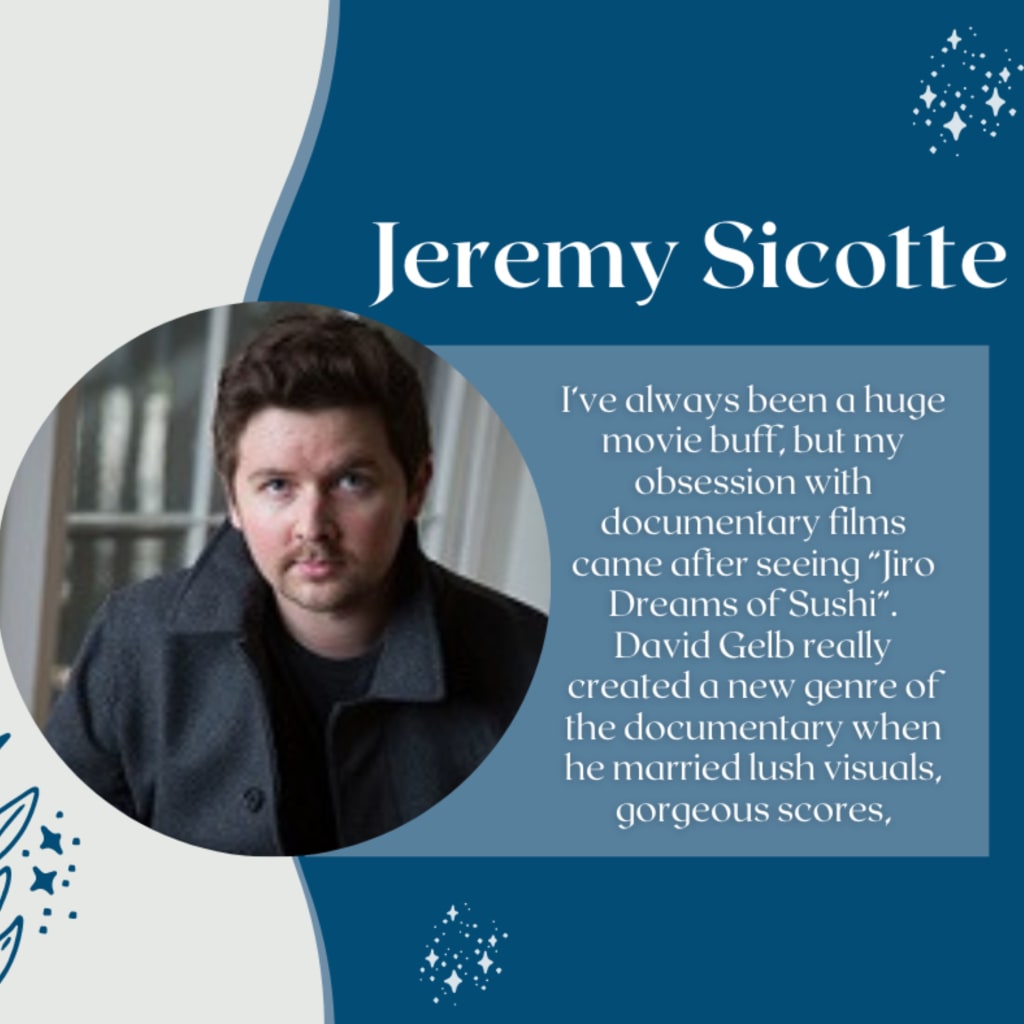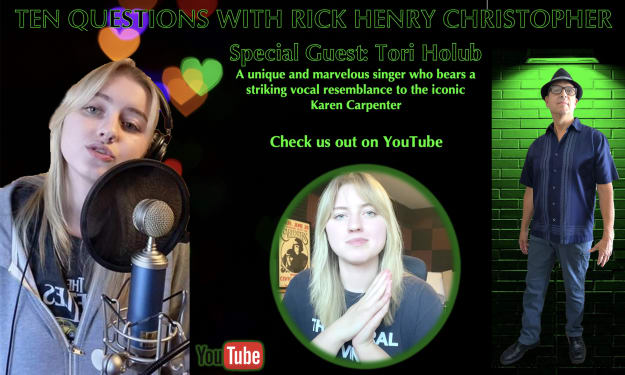Jeremy Sicotte's Interview for Filmmakers
one of the most valuable Interviews Ever from Jeremy Sicotte that will help the filmmakers to motivate

1. Where did the idea of becoming a Documentary Film Maker come from?
I’ve always been a huge movie buff, but my obsession with documentary films came after seeing “Jiro Dreams of Sushi”. David Gelb really created a new genre of documentary when he married lush visuals, gorgeous scores, and heartfelt storytelling. I immediately knew I wanted to pursue a career making films that move people at that level.
2. What does your typical day look like and how do you make it productive?
Research and planning are what occupy most documentary filmmaker's time. I’ve learned that the more prepared you are before production begins, the more freedom you have once you start filming to explore various angles because you know the material so well.
3. How do you bring ideas to life?
I can only speak for my creative process, but I always try to stay consistent in being creative every day. Some days may be more research-heavy in regards to the subject of the film I’m making, other days may be more technical with the look I’m trying to achieve, shots I’m working out, or other details in the filming itself. But I enjoy all parts of the process and the main thing is that I dedicate time every day to keeping my creative edge.
4. What’s one trend that excites you?
I’m very excited about the direction in which media is going. You don’t have to the backing of a major studio to make a large impact these days. The democratization of cameras and other filmmaking tools has allowed any creative person to immediately jump into making high-quality films. Additionally, with so many distribution channels to put your work out - it’s allowed many meaningful films to reach a wide audience that would have never had the opportunity a decade ago.
5. What is one habit of yours that makes you more productive as a Documentary Film Maker?
I think consuming a lot of films and content is a great way to constantly be challenging yourself to incorporate various techniques that you observe. The more you expose yourself, the more you can say “Yes, I love how
they edited this sequence to emphasize this important moment” or “Wow, what a unique way to highlight this scene's emotion with this choice of lens or framing.”
6. What advice would you give your younger self?
I would tell my younger self to never be afraid of telling the truth during the creative process. That when you censor your art for another person's opinion, you’re doing a disservice to the story and the impact of the message you’re trying to achieve.
7. Tell us something that’s true that almost nobody agrees with you on.
I think I’m an outcast in that I don’t see the appeal of David Lynch. I appreciate and respect the influence he’s had on generations of filmmakers, but for some reason, his work has never landed with me. With that said David Lynch was the reason, I began practicing Transcendental Meditation in my early twenties, so in that regard, I’m a fan and grateful to him.
8. As a Documentary Film Maker, what is the one thing you do over and over and recommend everyone else do?
I would say that as important as it is to be constantly reading and consuming content that’s related to your work and your interests, it’s equally important to be consuming ideas that are outside of your normal wheelhouse. When we immerse ourselves in new ideas and topics we can have excellent creative breakthroughs that help push us toward new ways of looking at things and help us to find new angles for ideas.
9. What is one strategy that has helped you grow your business? Please explain how.
I think that being bullish on what you want to achieve creatively is an avenue to how you really get people interested and excited about your work. A lot of people will not want to work with people who aren’t willing to be pushed around a bit, and that’s fine. But you will attract collaborators or investors who like someone who has a deep vision for what they’re trying to achieve and wants to help support those types of creators.
10. What is one failure you had as a Documentary Filmmaker, and how did you overcome it?
I’ve lost a week's worth of content by having hard drives fail. It can’t be said enough how important media management is and how the money will never be wasted on quality RAID drives. Triple back up all your content and then make an extra duplicate you can send to your Aunt in Kansas or somewhere offsite from where you’re editing. It will save you a ton of time and heartache if yours ever fail or are damaged.
11. What is one piece of advice that you’re willing to give away to our readers?
The truth is the creative life is damn hard. You are guaranteed to experience more challenges and frustrations than almost every other industry. But the upside is that when you have those moments of creative fulfillment and you enter into that flow state, there is nothing that can quite compare to it. It’s like you’ve given birth and all the demands and hell you went through to get here all become worth it. You become addicted to it. And it makes all the future frustrations and heartbreak worthwhile.
12. What is the best $100 you recently spent? What and why? (personal or professional)
It cost more than $100, but I recently purchased a new office chair. It’s mesh and has lumbar support and a headrest. Not only is my back thankful, but it’s another thing that gets me excited to sit down and focus on work. I think anything that can help sway to get into the creative zone is something worth spending money on.
13. What is one piece of software or a web service that helps you be productive? How do you use it?
I’ve been using Milanote for the last year and it’s really been a game changer for how I organize all my ideas. It’s helpful in all phases of filmmaking, but I especially enjoyed using it in preproduction to organize research, and it's been helpful to use for storyboarding and getting all my ideas down in a thoughtful and customizable manner. It’s a great tool for filmmakers I can’t recommend it more.
14. What is the one book that you recommend people should read and why?
I just finished “The Art of Impossible” by Steven Kotler and it was a really fantastic exploration of how people achieve these seemingly impossible feats and the science behind peak performance. I think it’d make a tremendous documentary or docs series.
15. What is your favorite quote?
“Nobody can bring you peace but yourself.” —Ralph Waldo Emerson This quote has become a mantra I live by and it constantly reminds me that we cannot control external events, we can only control how we react to them.
Reference Links for Jeremy Sicotte
About the Creator
Jeremy Sicotte
Jeremy Sicotte professionally known as J.J. Sicotte is an American Documentary Film Maker and Director of Photography. He was director of photography on cult UFO classics Above Majestic and The Cosmic Secret.






Comments
There are no comments for this story
Be the first to respond and start the conversation.